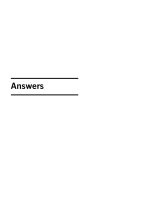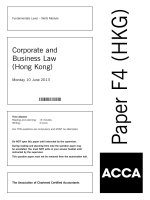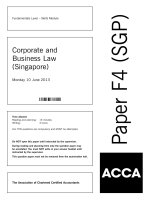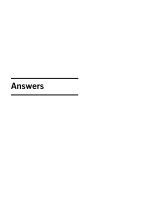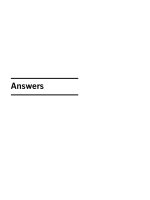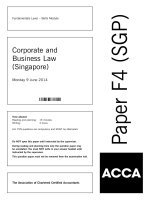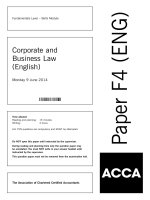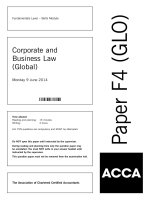ACCA f4 corporate and business law vietnam 2013 dec q
Bạn đang xem bản rút gọn của tài liệu. Xem và tải ngay bản đầy đủ của tài liệu tại đây (57.2 KB, 4 trang )
Corporate and
Business Law
(Vietnam)
Monday 9 December 2013
Time allowed
Reading and planning:
Writing:
15 minutes
3 hours
ALL TEN questions are compulsory and MUST be attempted.
Do NOT open this paper until instructed by the supervisor.
During reading and planning time only the question paper may
be annotated. You must NOT write in your answer booklet until
instructed by the supervisor.
This question paper must not be removed from the examination hall.
The Association of Chartered Certified Accountants
The Ministry of Finance of the Socialist Republic of Vietnam
Paper F4 (VNM)
Fundamentals Level – Skills Module
ALL TEN questions are compulsory and MUST be attempted
1
In relation to the Vietnamese legal system:
(a) Explain the purpose and significance of the Constitution.
(5 marks)
(b) Describe the different forms that legislation may take.
(5 marks)
(10 marks)
2
In relation to the law of obligations, explain the provisions of the Civil Code in respect of offer and acceptance.
(10 marks)
3
In relation to employment law:
(a) Explain the statutory requirements in respect of the creation of a labour contract.
(7 marks)
(b) Explain the statutory limitations which apply when employees are subject to a probationary period.
(3 marks)
(10 marks)
4
In relation to business organisations, distinguish between partnerships and limited companies.
(10 marks)
5
In relation to capital and financing and the Law on Enterprises:
(a) Explain the provisions that govern the redemption of shares of shareholding companies.
(7 marks)
(b) Explain the limitations applicable to shareholding companies in respect of the payment of dividends.
(3 marks)
(10 marks)
6
In relation to the management and administration of a shareholding company:
(a) Explain the rights and duties of the board of management.
(6 marks)
(b) Explain how members of the board of management may be appointed and removed.
(4 marks)
(10 marks)
7
In relation to corporate governance, describe any FIVE purposes of a company putting effective corporate
governance practices into place.
(10 marks)
2
8
Fastlearn College provides training courses for professional students. It engages the services of external lecturers,
performing under civil contracts, to deliver some of its courses.
In August 2013, Fastlearn College entered into a contract with Trang under which he would deliver a series of evening
lectures. The lectures were to take place every Wednesday evening for 10 weeks.
In September 2013, Fastlearn College entered into a contract with Mai under which she would deliver five revision
courses, each of two days’ duration.
Both contracts specified that payment would be made at the end of the programme.
In October 2013, with only five of the lectures having been delivered, Trang informed Fastlearn College that he was
finding the work too exhausting and would not be able to complete the programme of lectures.
In November 2013, after Mai had delivered two of the five revision courses, Fastlearn College wrote to Mai to inform
her that the three remaining courses would not be required after all, as the college had insufficient enrolments to go
ahead with them.
For both contracts, there were no clauses that envisaged the withdrawal of the parties from their commitments.
Required:
Discuss the consequences of the breaches of these contracts for Fastlearn College, Trang and Mai.
(10 marks)
9
Garment Co was formed in June 2013 as a limited liability company specialising in selling fashionable clothes. The
founders were Ba, Cam and Linh.
The preparations for forming the company were difficult, as the founders had to negotiate deals to purchase two shops
in desirable commercial locations. Having found suitable premises, Ba and Cam agreed that they would each
purchase one shop as part of their contributions to the share capital of the company, completing the purchases in
May 2013. Linh did not make such a contribution, but negotiated on behalf of the founders, securing very good prices
for the shops and facilitating the arrangement by paying a fee to a local public official.
Also in May 2013, Linh signed a contract for a large order of clothes so that the shops could be fully stocked in time
for opening.
Only weeks after the company’s launch, all three founders, now directors of the company, were disappointed with the
company’s performance. Ba and Cam blamed Linh for ordering clothes that did not appeal to customers. Linh stated
that she had been assured by the suppliers that the clothes were highly fashionable. Ba and Cam insisted that they
would not sanction the payment for the clothes, which Linh had agreed through a line of credit negotiated with the
suppliers.
Cam felt that they had all been mistaken in their business plans, and now believed that they should start selling
specialist clothing products, such as formal and ceremonial clothes. Although Ba and Linh disagreed strongly, Cam
stated that her colleagues had a duty to respect her wishes, as she had contributed one of the shops to the business.
Required:
(a) Discuss the obligations of Ba, Cam, Linh and Garment Co in respect of the purchase of the shops and the
clothing contract.
(6 marks)
(b) Discuss the extent to which Cam can insist that the shops should sell specialist clothing products.
(4 marks)
(10 marks)
3
[P.T.O.
10 Flop Co is a shareholding company which has gone into insolvent liquidation.
Flop Co has been unable to meet its obligations to suppliers for several weeks, with unsecured payables totalling 600
million dong. One supplier, Sell Co, has despatched goods to the company valued at 100 million dong. They are
currently in transit and have not been paid for.
Flop Co has a mortgage secured on its factory for 2,000 million dong, which represents approximately half of the
market value of the factory.
Flop Co also owes a further 200 million dong to its workers.
The directors of Flop Co gave personal guarantees to fully support other secured borrowings. Some of the shares held
by the directors are partly paid, with 600 million dong yet to be paid up.
Required:
With reference to the Law on Bankruptcy:
(a) Explain how the claims of the various creditors (payables) are prioritised.
(4 marks)
(b) Explain the obligations of the directors of Flop Co.
(4 marks)
(c) Explain whether Sell Co can recover the goods which it has despatched to Flop Co.
(2 marks)
(10 marks)
End of Question Paper
4
